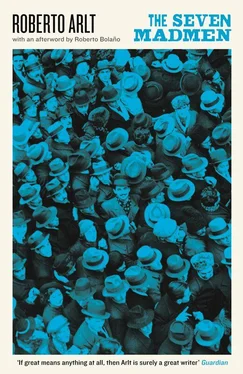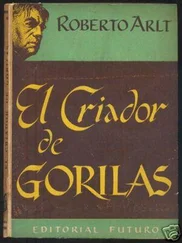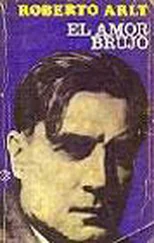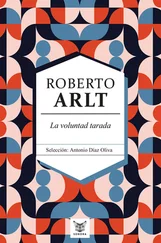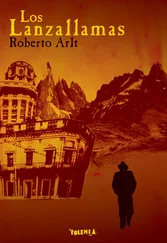All of a sudden some earlier words of his crept into his mind. The Astrologer said to himself:
“Why not? … We could make cannons, just like Erdosain says. It’s an easy enough process. Besides, they won’t need to be fired a thousand times. Any revolution which took that long would be a failure.”
He has run out of words. In the darkness the interior of his skull is filled with the image of a gloomy passage-way with beams holding up the sides of a corrugated iron shed; at the centre, among clouds of coal dust, rise the blast furnaces, their cooling systems like monstrous armour plating. Tongues of fire leap from the reinforced furnace mouths, while outside thick, impenetrable jungle stretches into the distance.
The Astrologer feels he has regained his personality from the strange double time that stole it from him.
He is thinking it would be possible to make chrome-plated steel and recoiling guns. Why not? His thoughts glide agilely now over the possible problems. With the money they earn from the brothels, they can buy plots of land all over Argentina for next to nothing. There the society members could build reinforced concrete emplacements for the artillery, disguising them as grain silos.
He is excited by the idea of creating a revolutionary army throughout the country, which would rise up on a radio signal from him. Why not? Steel, chrome, nickel. The words echo in his brain like a spell. Steel, chrome, nickel. Each cell leader would be in charge of an artillery battery. What was essential? For their cannon to fire four or five hundred shells. And machine guns mounted on trucks. Why not? For every ten men a machine gun, a truck, a cannon. Why not give it a try?
Slowly, deep in the dark night, a giant white-hot steel egg supported on two struts lifts its tip up to the roof. This is the Bessemer converter operated by a hydraulic piston. A stream of sparks and flames pours out of the end of the egg. This is the iron being converted into steel thanks to a jet of air blasted through it at hundreds of pounds’ pressure. Steel, chrome, nickel. Why not give it a try? His thoughts focus on a hundred details. A little earlier, the voice inside him had asked:
“Why is it that there’s so little room for human happiness?” This truth makes him sad. The world should be for the few. And those few should stride out like giants.
First create a complicated situation. Then resolve it with clear thought. First, kill Barsut, then set up the brothel, the training camp in the mountains … but how would they get rid of the body? Wasn’t it stupid for someone like him, who found it so simple to make a cannon or manufacture steel, chrome and nickel, to find it so hard to dispose of a single dead body? He shouldn’t waste so much time thinking about it … they can burn it … 500 degrees should be enough to destroy a body in a container. Five hundred degrees.
Time and weariness are gradually taking over his mind. He would like not to think, but suddenly the voice from inside, the one separate from his own voice and will, whispers more suggestions to him:
“The revolutionary movement will rise up simultaneously in every town in Argentina. We’ll attack every barracks. We’ll start by shooting all those who might cause trouble. A few days beforehand, we’ll release some kilos of typhus and bubonic plague in the capital. From aeroplanes at night. Each cell on the outskirts of the capital will cut the railway lines. We won’t let any trains in or out. With control of the country’s nerve centre and all communications cut, and the leaders shot, power is in our hands. All this may sound crazy, but it’s possible. When you’re about to carry out something like this, you’re always in a dream-like state, as if you were sleepwalking. Yet you go towards your goal with a kind of slow-motion speed that makes it all seem so surprising once you’ve got there. All you need is the willpower and money … Apart from our revolutionary cells, we can organise a gang of murderers and thieves. I wonder how many planes the army has? But once the communications are cut, the barracks taken over, and all the leaders shot, who is going to call them out? This is a country of dumb animals. We have to have firing squads. That’s indispensable. We’ll only win respect if we spread terror. Men are nothing but cowards. With a machine gun … How will they organise the forces meant to fight us? With the telegraph and the telephones out, and the railway lines cut … ten men can keep a town of 10,000 people in fear. All they need is a machine gun. Eleven million people in Argentina. The tea plantations of the north would be with us. The sugar-cane areas of Tucuman and Santiago del Estero … San Juan, they’re already half-communist there … the only opposition would be the army. We could take the barracks at night. Once we’ve seized their weapons, shot the officers and strung up all the sergeants, we’d only need ten men to hold a barracks of a thousand soldiers — provided we have a machine gun. It’s so easy. And what about the hand grenades, where do they come into it? If we can take them by surprise at the same time through the entire country, with ten men per town Argentina is ours. The soldiers are young and would follow us anyway. We’ll make officers of the non-commissioned and create the most unlikely army in the history of America. Why not? What are the raids on the San Martin bank, or the hospital in Rawson, or the Martelli agency in Montevideo, compared to this? With three determined newspaper vendors we can take a city.”
An ill-defined anger makes the blood pound in his veins. The blood rushes through his sturdy body, all geared up as if for an attack. He feels stronger than ever, the strength of someone with the power to shoot others.
Each crash from the storm sent the electric light swinging, but the Astrologer went on sitting on the trunk with his back to the bed, legs crossed, chin in hand, staring fixedly at the five puppets, whose ragged shadows leapt and danced on the pink wall.
Behind him, the puddle from the rain seeping in at the window grew, and still the silent questions and answers flew through the air. Sometimes a frown darkened the Astrologer’s face, then a slow blink of his unmoving eyes in the broad face showed he had found a reply that satisfied him. He sat there until dawn, then stood up and turned his back on the five puppets, who were left in the solitude of the room, swinging on their gibbet like five hanged men.
The Astrologer hesitated for a moment, then rushed down the stairs, out of the front door, and strode over in the first light to the coachhouse where Barsut was being held.
The rain had stopped. The clouds had broken up, leaving the sight of a yellow slice of moon in a clear blue sky.
While all this was happening, in Las Mercedes asylum Ergueta was experiencing what he was later to call his “meeting with God”. This is how it happened.
He woke at dawn in the ward. An oblong of moonlight painted a blue rectangle on the whitewashed wall opposite his bed. The sky stood out framed by the wooden bars of the open window, a powdery dry blue like plaster dipped in methylene. Between the bars twinkled the watery beams of a distant star.
Ergueta scratched his nose energetically. He was not particularly worried. He understood that he was in a madhouse, but it “was something that didn’t concern him”.
He was worried they might have imprisoned his spirit, but what was actually locked up in the asylum was his body, his body weighing ninety kilos, which he now remembered with a surge of shame he had dragged through so many brothels. Unable to stop himself, he saw again the circus parade his dissolute life had been. What did his spirit have to do with all the fury of his flesh?
Читать дальше
